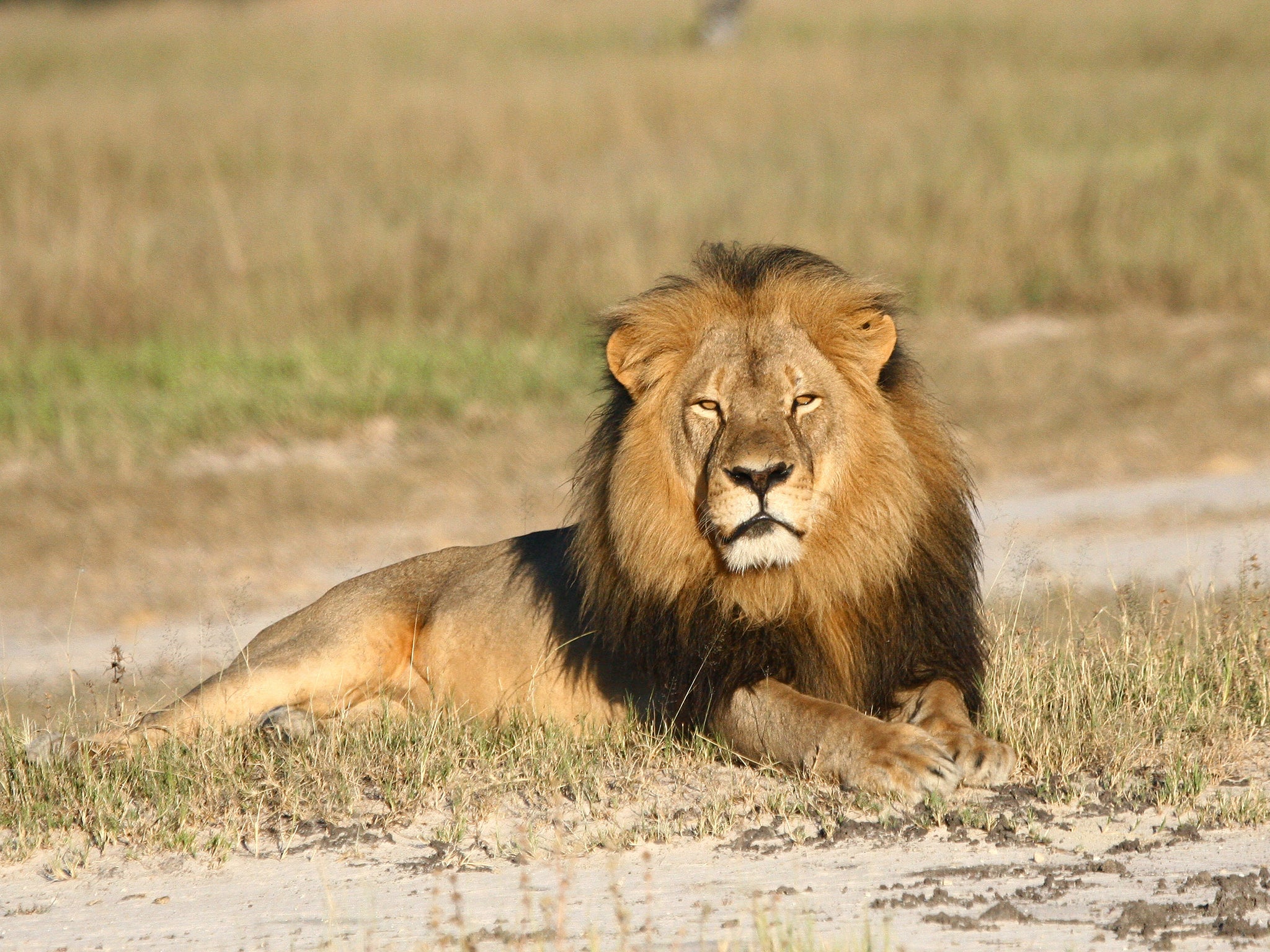Trophy-hunters win prizes for using ‘cruel’ bows as lion population drops on anniversary of Cecil’s death
Exclusive: Deadly new trend that prolongs animal suffering exposed on anniversary of Cecil the lion’s death

Western trophy-hunters are increasingly being encouraged to use bows and arrows, which prolong the suffering of a dying animal, experts have revealed.
One industry prize awards hunters for shooting 24 different species using four different methods – a rifle, a revolver, a crossbow and a muzzle-loader.
Being hit by a bow and arrow is “deliberate torture” because it leads to a slow, painful death for species such as lions, elephants, bears and giraffes, campaigners said.
They exposed the new trend in the trophy-hunting industry on the seventh anniversary of the death of Cecil, the Zimbabwean lion who was killed by a bow and arrow fired by US dentist Walter Palmer in 2015.
The deadly incentives for wiping out wildlife are revealed in a major report for MPs, based on investigations into trophy-hunting – killing animals for pleasure and saving their body parts.
One prize, the Safari Club International global hunting diamond award, is given to those who shoot at least 17 species in Africa, 13 species in North America, six in Asia, six in Europe, four in South America and a further four in the South Pacific.
Yet some of the world’s wildlife is “on its last legs”, the report warns, with wild lion numbers thought to potentially have dropped below 10,000 for the first time. Lions could vanish from the wild altogether by 2050, it’s feared, unless the decline is halted.
Linda Park, who works undercover in the captive lion-hunting industry, writes: “Cecil was left in agony for 11 hours after he was shot with a bow.
“There was another lion recently, Mopane, who was shot in the same area and was reportedly left for 24 hours.
“Encouraging hunters to shoot large animals such as lions with handguns and bows has enormous welfare implications.
“Bow hunting is incredibly cruel and yet it is an increasingly popular form of trophy hunting. It is anything but a clean kill and the animal will generally bleed out.”
Eduardo Goncalves, founder of the Campaign to Ban Trophy Hunting, said: “It’s a form of deliberate torture. And it wasn’t the exception – it’s increasingly the norm and is deliberately fuelled by the industry and these prizes.
”This is happening on an industrial scale. The majority are dying in a slow, excruciatingly painful way.”
The killing in 2015 of 13-year-old Cecil the lion at a Zimbabwean national park by the US dentist drove a rise in public revulsion at trophy-hunting.
The report, by all-party parliamentary group on trophy-hunting, says trophy-hunters shoot an animal every three minutes in the world, and at that rate, it is estimated they could kill up to 170 million animals this century at a time when the UN has warned a million species could die out.
The 278-page document sounds the alarm over the path to extinction facing lions, polar bears, elephants, giraffes, rhinos and leopards.
The report says there could now be as few as 9,610 lions – down from an estimated 200,000 in the 1970s – 6,674 cheetahs and 3,142 black rhinos left in the wild. Trophy hunting is said to account for up to a quarter of the decline.
Several lion populations have vanished in the past six years, the document reveals. “US government officials warn lions could vanish from the wild altogether by 2050, making it the first disappearance of a big cat since the prehistoric sabre-tooth tiger.”
Professor Phyllis Lee, emeritus professor at the University of Stirling and member of the House of Lords elephant welfare group, writes: “You can end up creating problem animals by trophy hunting. Animals who have experienced harassment from humans tend to retaliate with more aggression…
“The awards, which encourage trophy-hunters to shoot elephants with muzzleloader rifles, longbows, crossbows or handguns, represent a particularly cruel form of torture. It is something we should not inflict on any long-lived, sentient individual.”
Several experts interviewed by MPs and peers said trophy-hunting entrenches apartheid-era inequalities.
Boris Johnson’s government dropped a planned ban on trophy imports from the Queen’s speech and is now relying on a private member’s bill, due to be introduced to parliament in November, to pass a ban.
Over 500 body parts taken from endangered animals have come into Britain since the government said it would ban them
In an open letter to ministers launching the report, legends of music, sport and the arts, ranging from Shirley Bassey to Salman Rushdie, urged ministers to implement the much-delayed ban.
Others signing included singers Cliff Richard, Rod Stewart, Moby, Boy George and Chris Martin, football manager Alex Ferguson, actors Michael Caine, Judi Dench and David Jason, and celebrities Stephen Fry, Patsy Kensit and Gary Lineker.
MP Roger Gale, chair of the group, said: “Over 500 body parts taken from endangered animals have come into Britain since the government said it would ban them. Trophy-hunting is archaic, barbaric and should be consigned to the dustbin of history.”
Mr Goncalves added: “Some of the world’s wildlife is literally on its last legs.
“We need to act right now. Whaling was banned because populations had plummeted by 99 per cent. That’s the rate of decline we’re now seeing with some of Africa’s wildlife. Whale numbers bounced back from 360 to 25,000 thanks to the ban, so we know what to do.”
Subscribe to Independent Premium to bookmark this article
Want to bookmark your favourite articles and stories to read or reference later? Start your Independent Premium subscription today.

Join our commenting forum
Join thought-provoking conversations, follow other Independent readers and see their replies